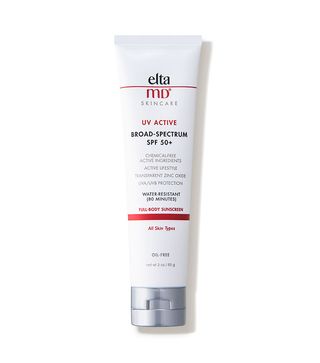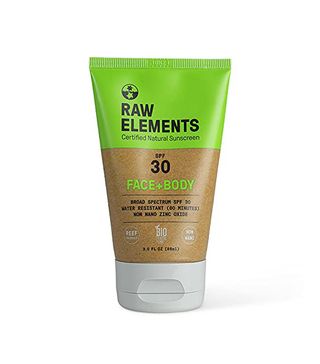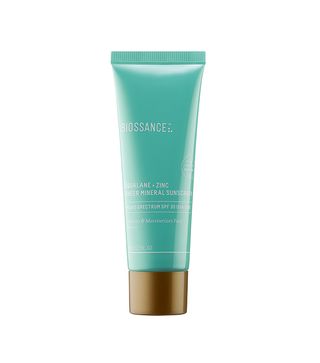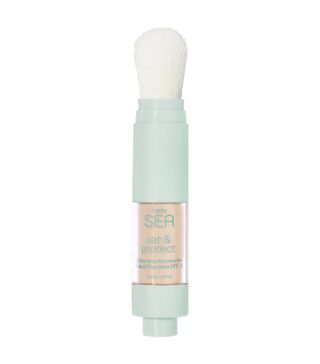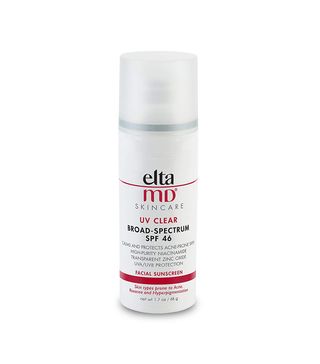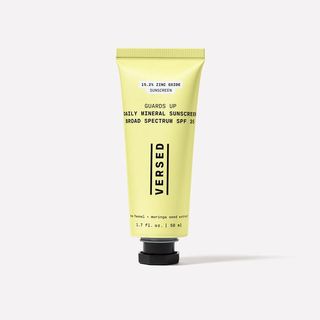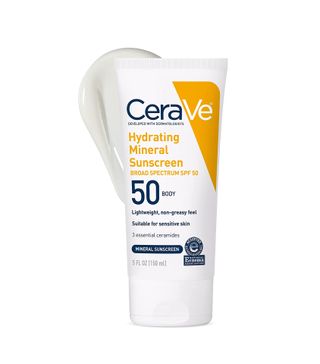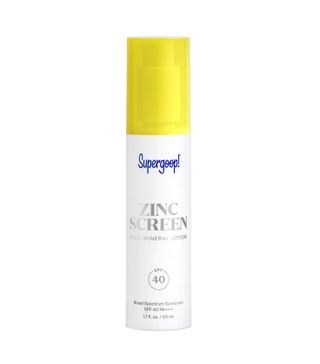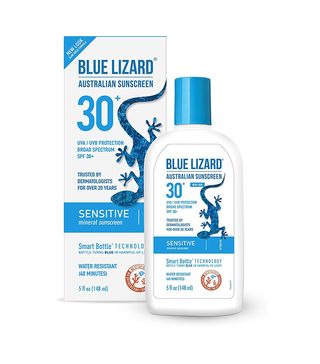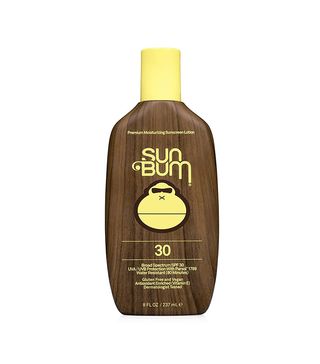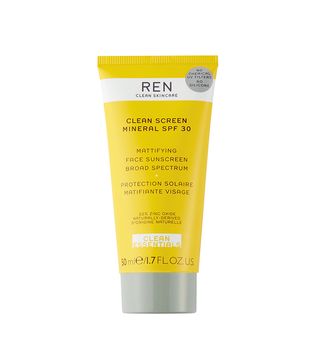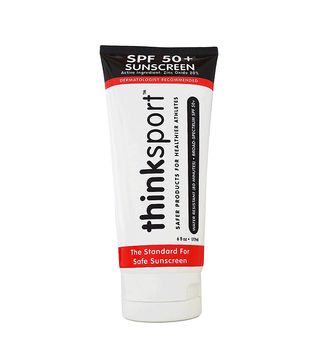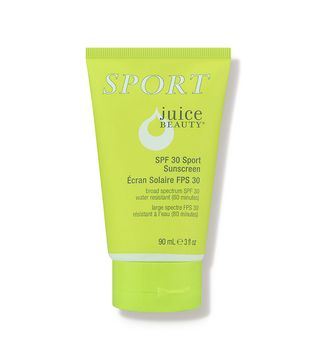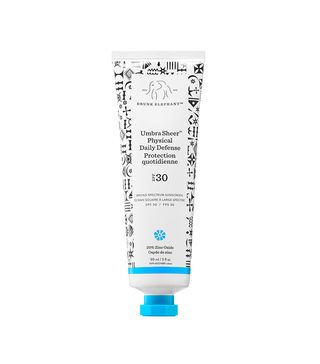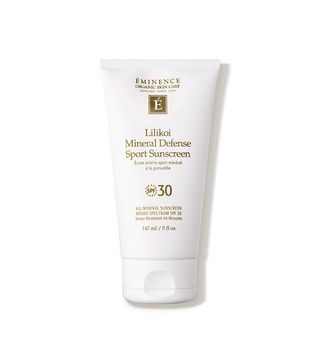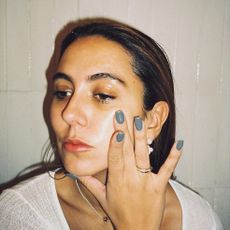Dermatologists Want You to Avoid These 5 Sunscreen Ingredients

It's pretty much a given that sunscreen is an important part of skincare. Things like sun damage, sunburns, and skin cancer are no joke. You want to do as much as you can to protect yourself whether you're spending the whole day by the beach or pool or just going about your everyday errands. Not only can applying sunscreen, seeking shade when you can, and wearing protective clothing help reduce your chances of getting skin cancer, but limiting damaging sun exposure can also prevent the signs of aging.
You might be thinking, Yeah, yeah, I know all of those things, and I wear sunscreen all the time. Well, first things first, that's an excellent start and habit. But second, have you given some thought to what's in your sunscreen? Not all of them are created the same, as formulations differ when it comes to brands and the product themselves. Just deciphering the words on a sunscreen bottle can be confusing. As overwhelming as it can be to choose a sunscreen, making sure you find one that is beneficial for your skin is important.
Sure, words like "nontoxic," "organic," "all-natural," or "noncomedogenic" all sound nice and helpful, but what do they really mean? What should you really look for and avoid in a sunscreen? And are we being duped by clever marketing and labels when we might be applying something that could be harming our bodies? I turned to the dermatologists and healthcare professionals for help on this one.
Nontoxic vs. Toxic

For starters, I wanted to know what made a sunscreen product "nontoxic" or "toxic." Well, it turns out the definitions weren't so cut-and-dried—and you'll see this is a recurring theme when it comes to parsing out sunscreen terms and ingredients throughout this story.
"Nontoxic and toxic are unregulated terms often used as a marketing claim without a clear definition," says Heather D. Rogers, MD, founder and CEO of Doctor Rogers Restore and co-founder of Modern Dermatology in Seattle. "And unfortunately, even though it should be clear what makes something toxic, for many ingredients it is not clear, and the onus is on the consumer to decide what he or she is comfortable with."
And Ellen Marmur, MD, a board-certified dermatologist and the founder Marmur Medical in New York City, agrees, adding that you shouldn't be so fixated on the terms. "Sunscreen adoption is far more important than labeling a sunscreen toxic or nontoxic," she explains. "Only one in 10 Americans use sunscreen daily and only half of Americans have worn it ever. Finding a broad-spectrum sunscreen that you can incorporate into your daily skincare routine is essential to preventing early aging and skin cancer caused by UV radiation."

Of course, there are sunscreens that do contain chemicals. "Sunscreens are often made with either chemical or mineral (aka physical) active ingredients to provide sun protection," explains Rogers. "Chemical sunscreens like oxybenzone, octinoxate, octisalate, and avobenzone must be absorbed into the skin before they can protect us from the sun's radiation. These ingredients protect the skin by absorbing the sun's rays and then converting them into heat that is released from the skin. These are not natural and likely nontoxic, but they do accumulate in our blood and waterways. We are studying this impact more. Mineral sunscreens, like zinc oxide and titanium dioxide, are natural and nontoxic. They sit on top of your skin and block the sun like reflectors."
The bottom line is the decision between a chemical or mineral sunscreen is based on your own personal preference.
Ingredients to Avoid
And when it comes to ingredients to avoid, it's also not as straightforward as you would think. Again, it depends on your preference and how comfortable you are with certain ingredients being absorbed into your body. Here are a couple of suggestions…
Insect Repellents

"Avoid sunscreens that contain insect repellent ingredients, like Deet," Marmur recommends. "Sunscreens are meant to be applied liberally and often, so using a combination product could result in unnecessary high exposure to repellents."
Oxybenzone, Octinoxate, Octisalate, and Avobenzone
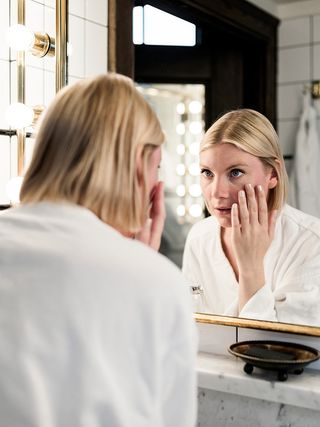
While Rogers said above that these chemicals are likely nontoxic, she does say she personally doesn't use products that contain them. "I would like to minimize the accumulation of any unneeded chemicals in my body, my patients' body, and in our world whenever possible, so I always recommend mineral/physical sunscreens," Rogers explains. "Especially when you take into account that avobenzone is a common cause of sunscreen allergy and oxybenzone is contributing to the death of coral reefs. I avoid all chemical sunscreen ingredients like oxybenzone, octinoxate, octisalate, and avobenzone because of their risk of allergy, irritation, accumulation in myself, and our world, and possible association with bleaching of coral reefs."
How to Choose a Sunscreen
If you've ever browsed the sunscreen aisle at your local drugstore, you know that there are so many options out there. When deciding which product to choose, our experts said to keep these things in mind:
Think About Your Skin Type

"As for sunscreen by skin type, there are huge differences in sunscreen formulas and there are so many available for different skin types," Rogers says. "You may have to hunt for what works best for you, just like finding the right pair of jeans. If you have dry skin, look for formulations that have hydrating ingredients. If you have oily skin, opt for something with a matte finish and oil-free. If you have sensitive skin, mineral-based sunscreens are particularly important because the most common chemical sunscreens can be irritating while zinc oxide is calming."
Look for Zinc Oxide
"My go-to sunscreen ingredient is zinc oxide, which provides the widest range of protection against UV rays and is more photostable than certain chemical sunscreens that may degrade over time," Marmur recommends. "Zinc oxide is an essential mineral that the body needs and easily recognizes. It's also safe for use on sensitive skin and is noncomedogenic. Make sure to choose a water-resistant sunscreen for high-endurance activities and swimming!" Zinc oxide protects against both UVA and UVB rays.
Opt for Mineral Formulas If You Have Certain Conditions
"I recommend all-physical sunscreen formulas for individuals who have sensitive, post-procedure skin," Marmur adds. "Sunscreens formulated with niacinamide also work particularly well to calm redness associated with rosacea or acne."
And if you're pregnant, you'll want to opt for zinc formulas, too. "Products in which the active ingredient is zinc oxide and titanium dioxide, which are physical sunscreens, are a definite good choice for pregnant women, as they are not absorbed by the skin," says Navya Mysore, MD, a family provider at One Medical.
Don't Settle for Anything Less Than SPF 30
All of our experts said that you want to buy a sunscreen that is at least SPF 30. "We typically only apply half as much product as used during the testing to determine SPF," Rogers explains. "So if a product is SPF 30, you are likely only getting SPF 15 protection. The higher the percentage of the sun-protective ingredients often is associated with a higher SPF. However, SPF only addresses your protection from UVB rays. It is equally important to make sure the product has broad-spectrum protection (meaning it protects you from UVB and UVA). Zinc provides the broadest protection of all the sunscreen ingredient options."
Avoid Fragrances
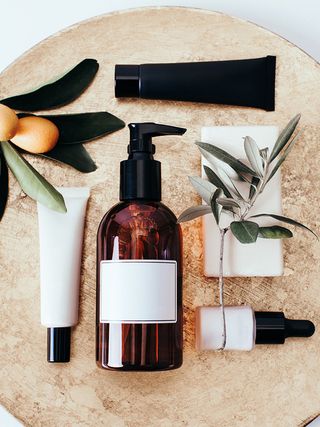
Sure, they could smell good, but they can also cause some trouble if you have sensitive skin. "It's also best to avoid sunscreens that include fragrance as those can be irritating to the skin," adds Mysore.
Consider Different Sunscreens for Different Needs
Rogers suggests getting different sunscreens for different parts of your body. "Since sunscreen should be an important part of your skincare routine, you will need more than one product," she explains. "My sunscreen wardrobe consists of the following: a daily face sunscreen which is tinted; a powder sunscreen for easy reapplication during the day; a body sunscreen not tinted and moisturizing for my neck, chest, and arms during summer days even at work; and a sunscreen that is water-resistant for exercise and water play."
Application Tips
And of course, your sunscreen won't work properly if you don't apply the product correctly. Here are some guidelines to follow:
Reapply Every Two Hours

"I recommend you reapply several times throughout the day, especially if you are exposing your body to direct sunlight," says Marmur. "As a rule of thumb, sunscreens should be reapplied approximately every two hours when outdoors, even on cloudy days, and after swimming or sweating, according to the directions on the bottle."
Follow These Steps When Moisturizing
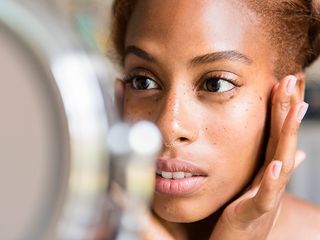
Sunscreen before moisturizer or vice versa is like the skincare version of "the chicken or the egg." But it all comes down to the type of product you're using. "If you are using a chemical sunscreen, it should go on your skin before your moisturizer because it needs to be absorbed into your skin to work," Rogers recommends. "If you are using mineral sunscreen, that should always go on after your moisturizer but before your makeup."
Wear Sunscreen Indoors

Even if you've been spending most of your days inside, that doesn't mean you should skimp on the sunscreen. "Another misconception is that we don't have to wear sunscreen indoors," Marmur says. "I have several patients that have shared with me that their melasma is actually getting worse, yet they have not been outside. What we need to remember is that we need to wear sunscreen even inside our house, and the sun's harmful UVA/UVB rays can cause skin damage. Even the blue infrared light emanating from our computer screens can cause damage to our skin!"
Don't Rely on Makeup as Your Sunscreen Source

A lot of makeup formulas contain SPF now, but Rogers says you should still have a separate product. "You still need to use an antioxidant serum with vitamin C and moisturizer (if you have dry skin) before you apply your sunscreen and makeup after," she suggests. "There are some great sunscreen options with tint in them that can work to blend the skin, but very few makeup brands have enough physical sun protection, so don't rely on your makeup as your primary sunscreen."
Editor-Favorite Sunscreens
Need more suggestions for sunscreens? These are some of our picks below:
Versed's lightweight sunscreen blends in easily and doesn't leave a chalky finish. It contains 15.2% non-nano zinc oxide, sea fennel extract, and moringa seed extract.
CeraVe's body sunscreen is formulated with zinc oxide and titanium dioxide plus three essential ceramides to lock in moisture and protect the skin barrier.
This 100% mineral lotion is lightweight and also contains ingredients to protect skin from environmental damage and pollution.
Blue Lizard's zinc sunscreen is reef-safe and doesn't contain parabens or fragrance. It provides up to 40 minutes of water resistance.
This sunscreen provides UVA and UVB protection without oxybenzone or octinoxate. It's also enriched with vitamin E.
Apply this matte sunscreen to your face for both sun protection and some other skin benefits like pore minimization, shine control, and oil absorption.
Thinksport's sunscreen has a high ranking on the Environmental Working Group's list, meaning it has low risk of harmful ingredients. The zinc formula doesn't contain avobenzone, oxybenzone, parabens, or phthalates.
This reef-safe sunscreen is enriched with antioxidants and vitamins to prevent free-radical damage. It's also water-resistant.
Drunk Elephant's daily sunscreen includes 20% zinc oxide plus algae extract and sunflower sprout extract to defend against free radicals. It's also free of essential oils and fragrances.
This body sunscreen not only contains zinc oxide, but it has botanical ingredients like lilikoi (passion fruit) seed oil and aloe vera to reduce the signs of aging and soothe skin.
Next Up: These 5 Habits Are Wrecking Your Skin—Here's What Experts Say to Do Instead
This article was originally published at an earlier date and has since been updated.
Disclaimer
This article is provided for informational purposes only and is not intended to be used in the place of advice of your physician or other medical professionals. You should always consult with your doctor or healthcare provider first with any health-related questions.
Sarah is lifestyle writer and editor with over 10 years of experience covering health and wellness, interior design, food, beauty, and tech. Born and raised in Los Angeles, she attended New York University and lived in New York for 12 years before returning to L.A. in 2019.
In addition to her work on THE/THIRTY and Who What Wear, she held editor roles at Apartment Therapy, Real Simple, House Beautiful, Elle Decor, and The Bump (sister site of The Knot).
She has a passion for health and wellness, but she especially loves writing about mental health. Her self-care routine consists of five things: a good workout, “me” time on the regular, an intriguing book/podcast/playlist to unwind after a long day, naps, and decorating her home.
-
 I'm the "Wellness Girl" of My Group—30 Buys I'd Recommend to All My Friends
I'm the "Wellness Girl" of My Group—30 Buys I'd Recommend to All My FriendsFeel (and look) your best.
By Emma Walsh
-
 Ty Haney Prioritizes Moving Her Body in the Mornings—Here's Why You Should Too
Ty Haney Prioritizes Moving Her Body in the Mornings—Here's Why You Should TooShe calls it "changing the chemistry."
By Candice Aman
-
 How This Clean-Bodycare Founder and Mom Winds Down on the Weekends
How This Clean-Bodycare Founder and Mom Winds Down on the WeekendsCalm vibes only.
By Candice Aman
-
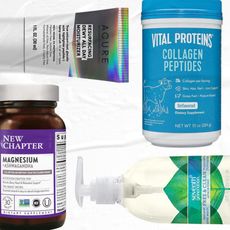 I Want to Start Adding Healthier Products to My Routine—This Site Has It All
I Want to Start Adding Healthier Products to My Routine—This Site Has It AllMajor life hacks ahead.
By Aniyah Morinia
-
 The Founder of This California-Chic Brand Shares Her Restorative Evening Rituals
The Founder of This California-Chic Brand Shares Her Restorative Evening RitualsSimple, cozy, and luxurious.
By Candice Aman
-
 Body Positivity Influencer Alicia McCarvell Shares Her Feel-Good Night Routine
Body Positivity Influencer Alicia McCarvell Shares Her Feel-Good Night RoutineHer TikToks help to inspire and bring joy to her 2.8 million followers.
By Candice Aman
-
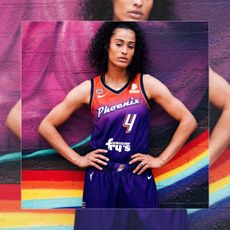 WNBA Star Skylar Diggins-Smith Wants to Make Room for Mindfulness
WNBA Star Skylar Diggins-Smith Wants to Make Room for MindfulnessThe sports star shared her wellness routine with us.
By Sarah Yang
-
 These 17 Powerhouse Foods Will Protect Your Whole Body
These 17 Powerhouse Foods Will Protect Your Whole BodyAnd they're easy to add to your diet.
By Sarah Yang
